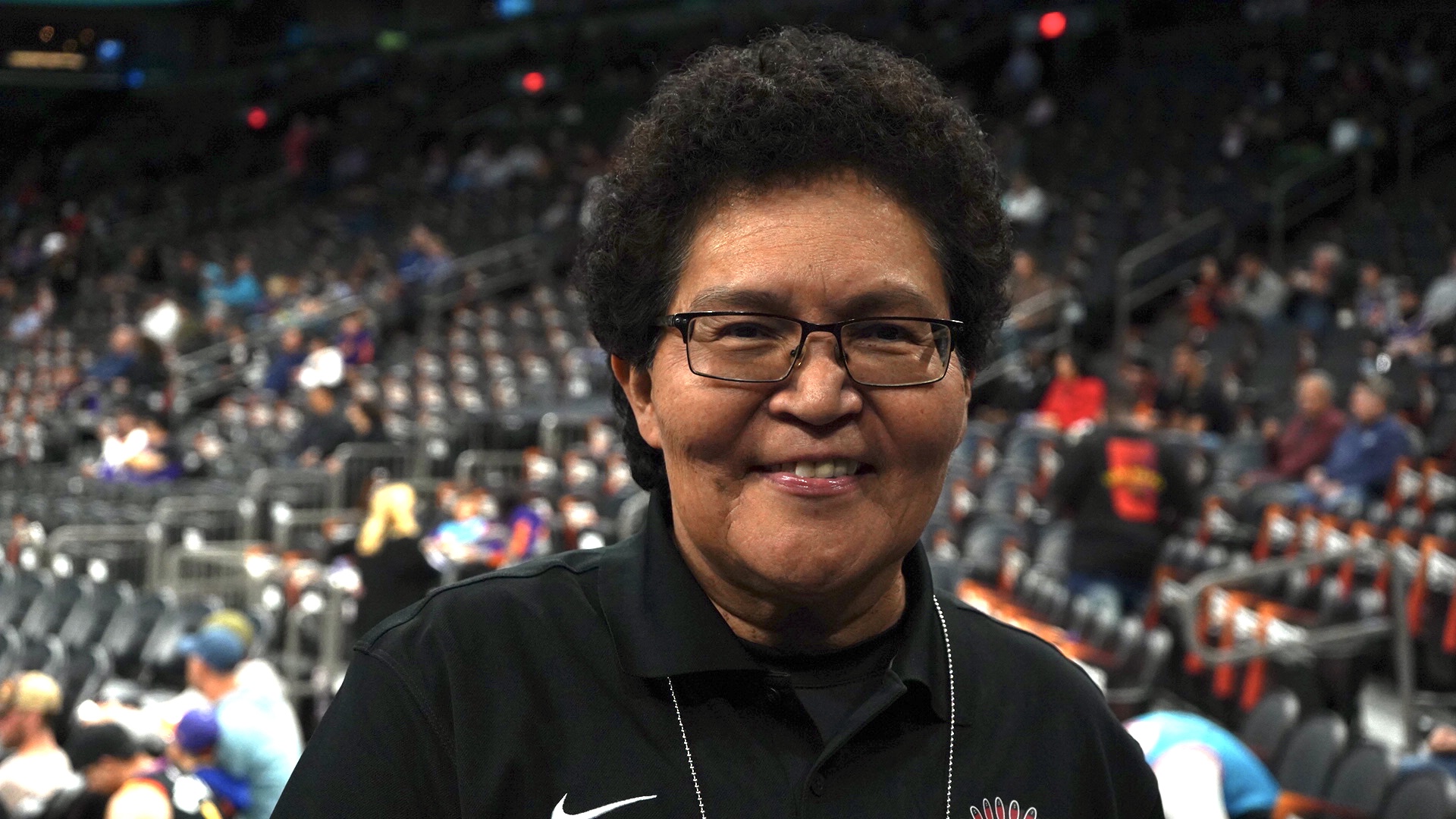
- Details
- By Darren Thompson
PHOENIX —As the Phoenix Suns began its postseason run in the NBA playoffs, the Navajo language has, too.
Navajo sportscaster L.A. Williams will broadcast the Phoenix Suns playoff stint in Diné Bizaad — the language of the Navajo people — KTNN 101.5 FM. The Suns are ranked 3rd in the NBA Playoffs in the Western Division and are tied as they enter their third game in a best-of-five-game matchup against the Los Angeles Clippers tonight on the Clippers' home court.
Williams, 57, has been sports commenting in Diné Bizaad since 1993. This year marks her second consecutive season broadcasting a Suns playoff run.
“Being asked to carry the game in the Navajo language is a tremendous job, but what it takes is to be a sports person,” Williams said in an interview with Native News Online. “You have to like sports to commentate and put yourself in the shoes of the athletes and where they are coming from.”
Williams began sportscasting when the Phoenix Suns had a successful playoff run that matched them against the Michael Jordan-led Chicago Bulls in the 1992-1993 NBA Finals. Longtime Suns broadcaster Al McCoy approached Williams during the 1993 Arizona high school state playoffs and asked if KTNN — the radio station of Navajo Nation —could broadcast the game in Diné Bizaad.
“He was one who’s introduced us and welcomed us to broadcast in the Navajo language during the 1993 championship run,” she said
After the 1993 championship stint, KTNN followed and commented on the Suns for three seasons.
Last year, Williams was invited back by the Suns senior director of Live Presentation, Shawn Martinez, also a Navajo Nation citizen from Window Rock.
Williams is also the director of KXWR, a sportscasting program at Diné College, where she teaches the next generation of native speakers to carry on the craft of sportscasting in their language. She notes that the language is highly descriptive and nuanced, adding the complexities of live commentary.
“There are five different ways to describe ‘foul’ in the Navajo language, depending on their excitement and actions,” Williams said. “The Navajo language is a very descriptive language. Teaching how to use the language in a public speaking format is a new thing — there’s a way to it.”
The key is to put some humor into it,” she said of her craft. “I put myself in the positions of the players, of how the coaches walk on the sidelines, or how the audience is responding.”
Williams says that the Navajo language is in higher demand than ever.
“We’re being told we’re losing our language,” Williams said. “We’re not. We’re still here on this earth and we’re not going anywhere. We still have our Navajo language.”
More Stories Like This
Celebrating 50 Years: The Rockwell Museum Looks to the Future with "Native Now"AMC Announces Return of Dark Winds for Season 4, Premiering February 15
Film featuring Teyton Colbert to hit theaters in November
Tlingit Hunter and Artisan Heather Douville Shares Cultural Traditions in New MeatEater Series “Our Way of Life”
What Inspires Indigenous Ballet Dancer Jock Soto
Help us tell the stories that could save Native languages and food traditions
At a critical moment for Indian Country, Native News Online is embarking on our most ambitious reporting project yet: "Cultivating Culture," a three-year investigation into two forces shaping Native community survival—food sovereignty and language revitalization.
The devastating impact of COVID-19 accelerated the loss of Native elders and with them, irreplaceable cultural knowledge. Yet across tribal communities, innovative leaders are fighting back, reclaiming traditional food systems and breathing new life into Native languages. These aren't just cultural preservation efforts—they're powerful pathways to community health, healing, and resilience.
Our dedicated reporting team will spend three years documenting these stories through on-the-ground reporting in 18 tribal communities, producing over 200 in-depth stories, 18 podcast episodes, and multimedia content that amplifies Indigenous voices. We'll show policymakers, funders, and allies how cultural restoration directly impacts physical and mental wellness while celebrating successful models of sovereignty and self-determination.
This isn't corporate media parachuting into Indian Country for a quick story. This is sustained, relationship-based journalism by Native reporters who understand these communities. It's "Warrior Journalism"—fearless reporting that serves the 5.5 million readers who depend on us for news that mainstream media often ignores.
We need your help right now. While we've secured partial funding, we're still $450,000 short of our three-year budget. Our immediate goal is $25,000 this month to keep this critical work moving forward—funding reporter salaries, travel to remote communities, photography, and the deep reporting these stories deserve.
Every dollar directly supports Indigenous journalists telling Indigenous stories. Whether it's $5 or $50, your contribution ensures these vital narratives of resilience, innovation, and hope don't disappear into silence.
 The stakes couldn't be higher. Native languages are being lost at an alarming rate. Food insecurity plagues many tribal communities. But solutions are emerging, and these stories need to be told.
The stakes couldn't be higher. Native languages are being lost at an alarming rate. Food insecurity plagues many tribal communities. But solutions are emerging, and these stories need to be told.
Support independent Native journalism. Fund the stories that matter.
Levi Rickert (Potawatomi), Editor & Publisher
